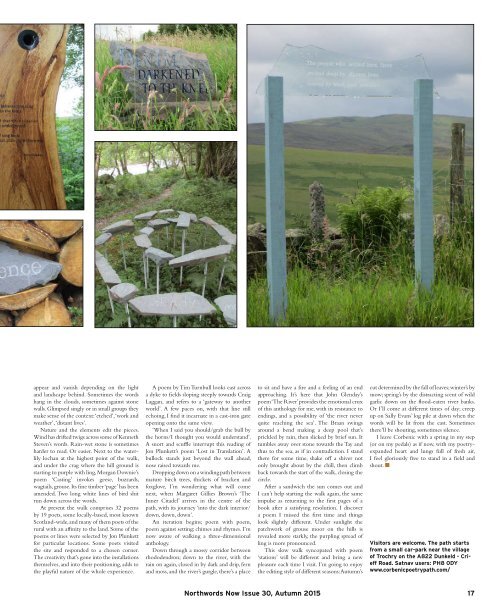Northwords Now
7c35eT
7c35eT
You also want an ePaper? Increase the reach of your titles
YUMPU automatically turns print PDFs into web optimized ePapers that Google loves.
appear and vanish depending on the light<br />
and landscape behind. Sometimes the words<br />
hang in the clouds, sometimes against stone<br />
walls. Glimpsed singly or in small groups they<br />
make sense of the context: ‘etched’, ‘work and<br />
weather’, ‘distant lives’.<br />
Nature and the elements edit the pieces.<br />
Wind has drifted twigs across some of Kenneth<br />
Steven’s words. Rain-wet stone is sometimes<br />
harder to read. Or easier. Next to the waterlily<br />
lochan at the highest point of the walk,<br />
and under the crag where the hill ground is<br />
starting to purple with ling, Morgan Downie’s<br />
poem ‘Casting’ invokes geese, buzzards,<br />
wagtails, grouse. Its fine timber ‘page’ has been<br />
amended. Two long white lines of bird shit<br />
run down across the words.<br />
At present the walk comprises 32 poems<br />
by 19 poets, some locally-based, most known<br />
Scotland-wide, and many of them poets of the<br />
rural with an affinity to the land. Some of the<br />
poems or lines were selected by Jon Plunkett<br />
for particular locations. Some poets visited<br />
the site and responded to a chosen corner.<br />
The creativity that’s gone into the installations<br />
themselves, and into their positioning, adds to<br />
the playful nature of the whole experience.<br />
A poem by Tim Turnbull looks east across<br />
a dyke to fields sloping steeply towards Craig<br />
Laggan, and refers to a ‘gateway to another<br />
world’. A few paces on, with that line still<br />
echoing, I find it incarnate in a cast-iron gate<br />
opening onto the same view.<br />
‘When I said you should/grab the bull by<br />
the horns/I thought you would understand’.<br />
A snort and scuffle interrupt this reading of<br />
Jon Plunkett’s poem ‘Lost in Translation’. A<br />
bullock stands just beyond the wall ahead,<br />
nose raised towards me.<br />
Dropping down on a winding path between<br />
mature birch trees, thickets of bracken and<br />
foxglove, I’m wondering what will come<br />
next, when Margaret Gillies Brown’s ‘The<br />
Inner Citadel’ arrives in the centre of the<br />
path, with its journey ‘into the dark interior/<br />
down, down, down’.<br />
An iteration begins; poem with poem,<br />
poem against setting; chimes and rhymes. I’m<br />
now aware of walking a three-dimensional<br />
anthology.<br />
Down through a mossy corridor between<br />
rhododendron; down to the river, with the<br />
rain on again, closed in by dark and drip, fern<br />
and moss, and the river’s gurgle, there’s a place<br />
to sit and have a fire and a feeling of an end<br />
approaching. It’s here that John Glenday’s<br />
poem ‘The River’ provides the emotional crux<br />
of this anthology for me, with its resistance to<br />
endings, and a possibility of ‘the river never<br />
quite reaching the sea’. The Braan swings<br />
around a bend making a deep pool that’s<br />
prickled by rain, then slicked by brief sun. It<br />
tumbles away over stone towards the Tay and<br />
thus to the sea, as if in contradiction. I stand<br />
there for some time, shake off a shiver not<br />
only brought about by the chill, then climb<br />
back towards the start of the walk, closing the<br />
circle.<br />
After a sandwich the sun comes out and<br />
I can’t help starting the walk again, the same<br />
impulse as returning to the first pages of a<br />
book after a satisfying resolution. I discover<br />
a poem I missed the first time and things<br />
look slightly different. Under sunlight the<br />
patchwork of grouse moor on the hills is<br />
revealed more starkly, the purpling spread of<br />
ling is more pronounced.<br />
This slow walk syncopated with poem<br />
‘stations’ will be different and bring a new<br />
pleasure each time I visit. I’m going to enjoy<br />
the editing style of different seasons: Autumn’s<br />
cut determined by the fall of leaves; winter’s by<br />
snow; spring’s by the distracting scent of wild<br />
garlic down on the flood-eaten river banks.<br />
Or I’ll come at different times of day; creep<br />
up on Sally Evans’ log pile at dawn when the<br />
words will be lit from the east. Sometimes<br />
there’ll be shouting, sometimes silence.<br />
I leave Corbenic with a spring in my step<br />
(or on my pedals) as if now, with my poetryexpanded<br />
heart and lungs full of fresh air,<br />
I feel gloriously free to stand in a field and<br />
shout. n<br />
Visitors are welcome. The path starts<br />
from a small car-park near the village<br />
of Trochry on the A822 Dunkeld - Crieff<br />
Road. Satnav users: PH8 0DY<br />
www.corbenicpoetrypath.com/<br />
<strong>Northwords</strong> <strong>Now</strong> Issue 30, Autumn 2015 17


